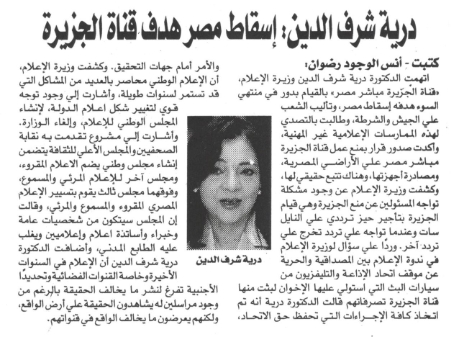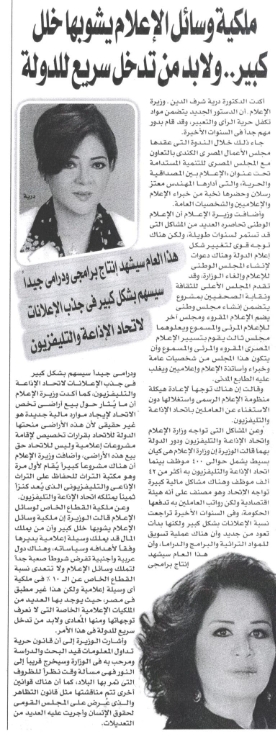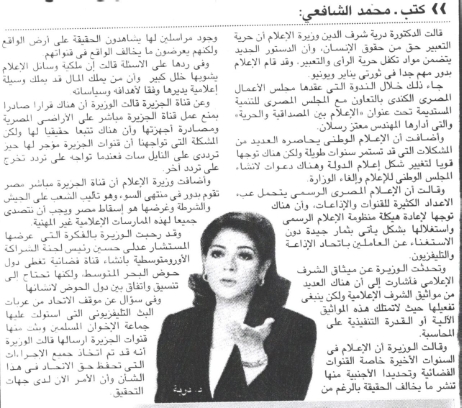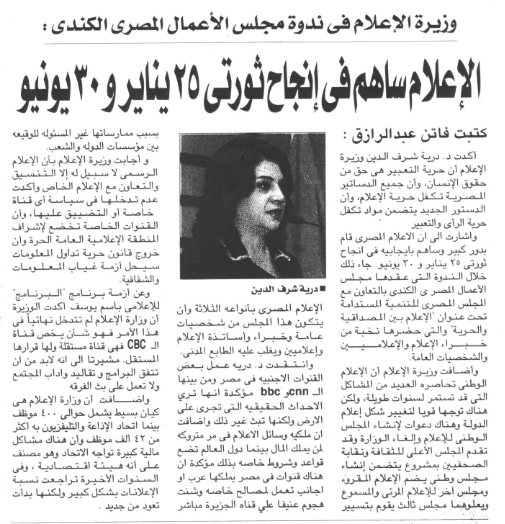
Date
Speaker(s)
Designation
Description
The Canada Egypt Business Council (CEBC) hosted a special event and panel discussion featuring H.E. Dr. Dorria Sharaf Eldin, Minister of Information on November 18, at the Semiramis Intercontinental Hotel. Joining Sharaf Eldin on the panel was renowned talk show host Khairy Ramadan and PR guru Loula Zaklama, President and Managing Director of RadaResearch and Public Relations. The discussion revolved around challenges facing state- and privately-owned media, the predicament of media objectivity and credibility, in addition to freedom of information.
Over 250 distinguished attendees were present at the event. The attendees were former ministers, ambassadors, CEBC members and guests, among whom were former ministers Dr. Ibrahim Fawzy, Dr. Othman Ahmed Othman, Dr. Ali Moselhy, Dr. Ahmed Darwish, Eng. Abdullah Ghorab, Eng. Alaa Fahmy, Counselor Adly Hussein. Also present were H.E. David Drake, Ambassador of Canada, in addition to their Excellencies the Ambassadors of Georgia, Greece, Malta, Japan, Romania and Slovakia.
CEBC Chairman, Mr. Motaz Raslan, delivered the opening remarks. In his introduction, he highlighted the importance of the media in this current period; describing the era as “The Era of Information (Media)”. He likened the power of the media to that of a military, saying that it has surmounted it in strength and influence. He added that the media has played an important role in toppling the two former Egyptian regimes. He said that the media’s right to freedom of expression has wrongfully transformed it into a battle field; a place to settle political scores and to incite sedition among the sons of the one nation. He expressed his reservations on how superficial some media outlets are, despite his faith in expanding freedoms granted to the media, he said. In conclusion to his word, Raslan quoted Hitler-era Minister of Information, Joseph Goebbels, in an attempt to emphasize the inverse role of media. “Give me a media without conscience; I give you a people without consciousness (awareness),” Raslan said quoting Goebbels.
A media guru, writer and the first woman to hold the position of Minister of Information, Dorria Sharaf Eldin holds a bachelor degree in Political Science, a Master’s in Film Criticism and a Ph.D. is the Philosophy of Arts. She also held a number of senior positions in the Ministry of Information, prior to becoming a Minister. With an overview of the history of the right to free expression and its adoption in former Egyptian constitutions, and its implementation in practice, the Minister commenced her word saying that despite the criticism the media has been facing, it played an integral role in the region’s recent revolutions.
The Minister spoke of the changes that state-owned media – or the “national” media, as she prefers to refer to it – platforms will undergo the coming period. She spoke of suggestions to eliminate the Ministry of Information, of creating councils for the different forms of media among other potential restructuring options. Sharaf Eldin said that the Ministry’s suggestion to the Constitution-Amending Committee (CAC) regarding moderating the media in Egypt, entailed a single council for state-owned and private media; one which would eventually be non-governmental. The Minister also tackled the issue of the existence of multiple Codes of Honor for that field, which are not upheld. She emphasized the importance of creating the mechanisms to implement these codes of honor and to penalize those who do not abide by them. She also touched on the predicament of the nature of the entity entitled to hold the different media outlets accountable, if found in breach of a Code of Honor. Moreover, the Minister pinpointed the relation between the availability of information and transparency, and holding the media accountable, saying that the first is prerequisite to the second.
On disinformation, the Minister said that in the recent period it has been prevalent through foreign media outlets where these outlets have disseminated content that is contrary to Egyptian convictions and to reality at times. She sees that each (owner) State has its interests, which directs the content its media platform offers, however, the Minister said that the recipient Egyptian audience is becoming more intelligent and more able to distinguish between the different media outlets.
Famous talk show host Khairy Ramadan assumed the floor, following Minister Sharaf Eldin. Ramadan is the former managing editor of Arabic-speaking Al Ahram Newspaper and a former columnist in El Watan and Al Masry Al Youm. Ramadan candidly shared with the audience the challenges facing privately-owned media in Egypt. Boldly, he said, “We are not objective”, then continued, “and we were not required to be objective in one of the stages.” Ramadan said that this deviation from professionalism was necessary in exposing the former Muslim Brotherhood regime; a regime that “wanted to take over the country”. He also said that this phase is over, however, the unprofessionalism and lack of objectivity remains. According to Ramadan, lack of information and transparency from the current government is one of the challenges facing the media today. He also sees that media professionals are currently under pressure and are accused of having ulterior motives or “foreign agendas”, if they criticize the current cabinet or the work of the CAC.
In the discussion that followed the panelists’ speeches, the attendees asked questions covering a range of topics from the suspension of Satirist Bassem Youssef’s show to the current state of the movie industry.
While victors write history, in Egypt today, it is the media who makes the victors; a power that requires moderation from an objective entity that unfortunately does not yet exist in the ongoing transitional phase. With hopes that the future would bring forth room for such objective controls, one just has to believe in the intelligence of the Egyptian recipient audience.




























